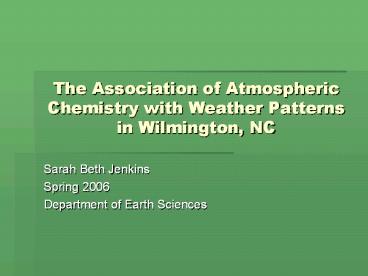The Association of Atmospheric Chemistry with Weather Patterns in Wilmington, NC
1 / 16
Title:
The Association of Atmospheric Chemistry with Weather Patterns in Wilmington, NC
Description:
Title: The Association of Atmospheric Chemistry with Weather Patterns in Wilmington, NC Author: ITSD Last modified by: Sarah Beth Jenkins Created Date –
Number of Views:144
Avg rating:3.0/5.0
Title: The Association of Atmospheric Chemistry with Weather Patterns in Wilmington, NC
1
The Association of Atmospheric Chemistry with
Weather Patterns in Wilmington, NC
- Sarah Beth Jenkins
- Spring 2006
- Department of Earth Sciences
2
Introduction
- Why is rainwater chemistry important? Air
pollution
Acid Rain in United States (Source Lutgens and
Tarbuck 2003)
3
Southeast North Carolina
- What rainwater chemistry issue is important?
Nitrate analytes
4
(No Transcript)
5
(No Transcript)
6
Hog Farm Flooding in Eastern North Carolina after
Hurricane Floyd in September 1999 (Source Mallin
2000)
7
MACRL Study
- Feb 2002- Aug 2003
- 129 rain events
- Ammonium, nitrate, organic nitrogen, free amino
acids - Trajectory Analysis
- Weather patterns?
8
Specific Objectives
- Determine if weather conditions vary by seasons
through comparison by six winter and six summer
rain events as measured by the MACRL study on the
UNCW campus (expanded data base) - Determine if weather conditions vary by
terrestrial and marine trajectories as identified
in previous studies - Determine if weather conditions vary by chemical
type including hydrogen peroxide, nitrate,
non-sea salt sulfate, chloride, and dissolved
organic carbon as measured by the MACRL study on
the UNCW campus
9
Terrestrial
Mixed
Coastal
Mixed
Air-mass back trajectories as produced by Long
(2003)
Oceanic
10
Methodology
- Collect meteorological data
- Day/Hourly reports 48 hrs preceding each rain
event. - Calculate descriptive statistics (mean, standard
deviation, range, etc.) - Complete statistical tests to determine
significant difference in meteorological
conditions by season and storm trajectory
11
Dates of Storms Avg. Temp Avg. Wind Speed Avg. RH NO3-
12/11/2003 mar/mix 52 6.2 40 1
2/27/2004 coastal/mix 42.5 16.15 58 4.652
1/14/2005 marine 63 9.1 34 0.526
12/10/2003 terrestrial 43 2.05 50 1.89
2/14/2004 terrestrial 44 7.95 45 5.296
12/9/2004 continental 66.5 8.25 44 44.341
6/2/2005 5 marine 69 10.55 28 4.308
6/26/2005 5 marine 75 9.35 29 1.478
6/29/2005 5 marine 80 5.25 29 1.342
7/17/2004 terrestrial 80 5.3 48 22.729
5/24/2005 2 terrestrial 70.5 9.05 45 20.455
5/25/2005 2 terrestrial 72 8.15 43 11.865
12
Generate WXP 24-Hour MeteogramStation
Wilmington/New NC US KILM 2 34.27 -77.90 10 99999
81Data for KILM from 0000Z 12 DEC 03 to 2300Z 12
DEC 03ID TIME T TD RH DIR SPD GST ALT
SLP VIS CIL COV KILM 2353 48 38 68 270 7
991 129 10 CLR KILM 0053 44
38 79 260 5 993 134 10 CLR
KILM 0153 43 39 86 240 6
995 142 10 CLR
KILM 0253 42 38 85 270 5 997 147 10
CLR KILM 0353 42
38 85 260 5 997 149 10 CLR
KILM 0453 41 38 89 260 6
998 151 10 CLR KILM 0553 39 37
92 260 5 999 153 10 CLR KILM
0653 38 37 97 270 4 002 164 10 CLR
KILM 0753 38 33 83
310 4 003 169 10 CLR
KILM 0853 36 33 89 300 5 005
176 10 CLR KILM
0953 35 32 88 320 6 006 180 10 CLR
KILM 1053 34 31 88
310 4 009 189 10 CLR
KILM 1153 35 31 84 320 4 013
202 10 CLR KILM 1253 33 32 96
0 0 014 207 10 CLR
KILM 1353 40 33 76 0 3 016
212 10 CLR KILM
1453 43 32 65 40 7 017 216 10
CLR KILM 1553 46 31
55 340 6 017 217 10 CLR
KILM 1653 49 31 50 0 6
015 208 10 CLR
Source Plymouth State Weather Center 24 HR
Surface Station Summary Generator
13
Methodology
- Examine NOAA daily weather maps 48 hrs before
precipitation - Compare synoptic weather conditions by season and
storm trajectory - Examine radar images to determine spatial
distribution of rainfall - Compare rainfall distribution by seasons and
storm trajectories
14
NOAA Daily Weather Map (2006)
15
Radar image of Eastern North Carolina
Source Wilmington NWS FO
16
Product
- Description of local weather conditions and
synoptic weather patterns associated with
specific atmospheric chemistry patterns - Use information gained in study as environmental
protection tools - Suggest management strategies and pre-storm
procedures based on forecasted atmospheric
chemistry































